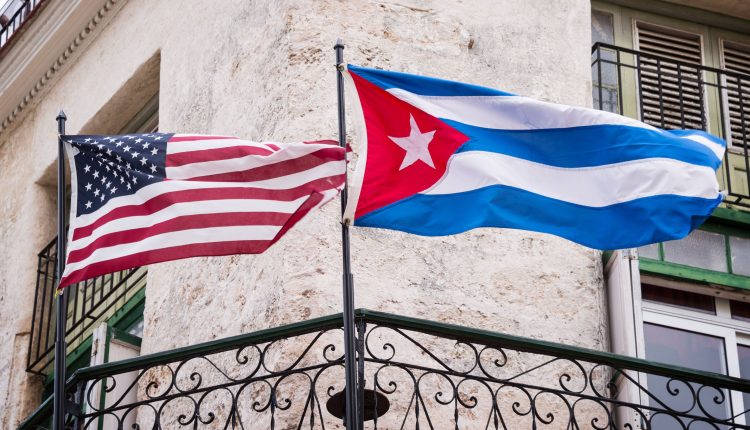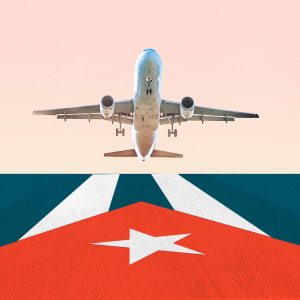
Cómo nació la agencia Marazul. Una historia personal.
Marazul Travel ha sido uno de los principales patrocinadores de Progreso Semanal / Weekly desde su creación, en el año 2001, toda vez que fue una iniciativa de Francisco González Aruca, presidente de Marazul hasta su deceso en 2013. Su banner aparece estampado en nuestra página web con la invitación: Get to Know Cuba with Marazul.
Pero ¿cuáles son los orígenes de Marazul?
La idea de crear una agencia de viajes de cubanos residentes en el exterior a Cuba, nació en una habitación del piso 20 del Hotel Riviera en diciembre de 1978, cuando un grupo de dirigentes de la Brigada Antonio Maceo y la revista Areíto, participantes en el “diálogo del gobierno cubano con figuras representativas de la comunidad cubana en el exterior”, decidimos aprovechar la reciente decisión cubana de autorizar las visitas de los emigrados a Cuba, prohibidas por ambos gobiernos desde hacía casi 20 años.
Para ejecutar estos acuerdos, el gobierno cubano creó una agencia mayorista, Havanatur S.A., y diversos emigrados se dieron a la tarea de crear una infraestructura de agencias de viajes en diferentes países y ciudades de mayor concentración de cubanos, para gestionar la venta de pasajes y facilitar el traslado de los viajeros a Cuba.
La primera empresa que surge de este grupo y también la primera que llevó cubanos emigrados a Cuba fue Viajes Varadero, fundada por Carlos Muñiz Varela, Raúl Álzaga y Ricardo Fraga en Puerto Rico. A pesar de los constantes ataques de los grupos terroristas de origen cubano y la derecha puertorriqueña, incluso del asesinato de Carlos, apenas meses después de inaugurada la empresa, un crimen nunca debidamente investigado y juzgado por las autoridades puertorriqueñas y estadounidenses, sus oficinas aún permanecen abiertas para brindar servicios a los cubanos en residen en ese país
En Estados Unidos nos propusimos crear otra empresa con el nombre de CubaTravel y se decidió crear tres oficinas: Washington, Miami y Nueva York. Al frente de la empresa quedaría Francisco Aruca, fundador de Areito, economista de profesión y residente en Washington DC. En Miami abriría la oficina Vicente Dopico, también fundador de Areíto, conjuntamente con Margarita Lejarza. Por último, en Nueva York me encargaría yo, con la colaboración de Vivian Otero.
Cuando fui a asentar el nombre de CubaTravel resultó que ya estaba inscrito por otra agencia, la cual me pedía 60 mil dólares por cedernos la marca, y nosotros no teníamos ni una décima parte de ese dinero. Tras consultar con mis socios decidí cambiar el nombre a Marazul, por el hotel del mismo nombre en Santa María del Mar, ahora llamado Tropicoco.
Prácticamente sin capital inicial, con un dinero que recaudamos entre todos, alquilamos una pequeña oficina en un edificio de Broadway y calle 34 en Manhattan, frente a Macy’s. Rápidamente se corrió la voz entre los emigrados cubanos de Nueva York y New Jersey y de inmediato comenzaron a llegar las personas interesadas en viajar. Al no haber espacio de recepción en la oficina, los clientes hacían cola en el pasillo esperando ser atendidos.
Se les llenaba los papeles y se les cobraba, creo que $600 ¡en efectivo! Al final del día acumulábamos varios miles de dólares que, si nos daba tiempo, depositaba en la sucursal cercana de Chemical Bank, donde teníamos la cuenta. Si se nos hacía tarde nos llevábamos los billetes en un cartucho en el subway hasta Washington Heights, donde vivía Vivian, ajenos al peligro que corríamos e incapaces de gastar dinero en tomar un taxi. ¡Éramos tan jóvenes!
El depósito diario de tanto efectivo produjo sospechas en el oficial del banco que nos atendía, un afro-estadounidense que un día se apareció en la oficina para verificar la operación y cuando vio la fila de cubanos comprendió que era un “fenómeno cultural” y no de lavado de dinero.
Así estuvimos varios meses hasta que la situación económica de la empresa mejoró y nos permitió mudarnos a una oficina más grande, también en una excelente locación: Broadway y calle 57, cerca del Parque Central. Logramos un buen local pagando un alquiler razonable, porque estuvimos dispuestos a aceptar el piso 13, que otros rechazaban por considerarlo de mala suerte. Empleamos más personas para atender a la clientela creciente, incluyendo una recepcionista santera que nos trajo protección contra diversos males, pero no pudo contra las amenazas terroristas que caracterizaron el controversial negocio, consistente en proporcionar a los emigrados cubanos la posibilidad de visitar a sus familiares y a su patria.
Peor lo tuvo la oficina de Miami, incluso llegaron a colocar una bomba en la casa de Vicente, “el colorao”, mientras dormía su pequeña hija, pero nunca interrumpieron el servicio. Aruca eventualmente se mudó para Miami y, además de dirigir la empresa, inauguró un programa radial llamado Radio Progreso Alternativa, que sacudió el ambiente dominado por las estaciones de radio “cubanas” de extrema derecha – WQBA “La Cubanísima”, Radio Mambí y otras – con un discurso progresista atrevido y retador, al punto de que, a pesar de ser un éxito de audiencia, le cerraron el acceso a las estaciones disponibles y lo sacaron del aire.
Comenzaba el periodismo digital y aprovechando esa oportunidad, Aruca, Álvaro Fernández y Manuel Alberto Ramy, primer corresponsal en Cuba, crearon Progreso Semanal / Weekly. Álvaro, como editor, ha mantenido el seminario contra viento y marea durante veinte años, y ahora un grupo de compañeras y compañeros lo estamos reforzando y relanzando en las redes sociales pues, a grandes males, mejores soluciones.
Y Marazul, ya en su tercera generación, nos sigue acompañando y apoyando.
*****
Translation to English:
How Marazul was born. A personal history
Marazul Travel has been one of the principal sponsors of Progreso Semanal / Weekly since its creation in 2001. It was an initiative of Francisco González Aruca, president of Marazul, who advanced it until his death in 2013. Its banner appears stamped on our web page with the invitation: Get to Know Cuba with Marazul.
But, what where the origins of Marazul?
 The idea of opening a travel agency for Cubans living in the US was hatched in a room on the 20th floor of the Habana Riviera Hotel in December 1978, when a group of directors of the Antonio Maceo Brigade and Areíto magazine, participants in the “Dialogue of the Cuban Government with representative figures of the Cuban community abroad”, decided to take advantage of the recent decision of the Cuban government to authorize the visit of its emigres to Cuba, prohibited by both governments for almost twenty years.
The idea of opening a travel agency for Cubans living in the US was hatched in a room on the 20th floor of the Habana Riviera Hotel in December 1978, when a group of directors of the Antonio Maceo Brigade and Areíto magazine, participants in the “Dialogue of the Cuban Government with representative figures of the Cuban community abroad”, decided to take advantage of the recent decision of the Cuban government to authorize the visit of its emigres to Cuba, prohibited by both governments for almost twenty years.
To implement these accords, the Cuban government created a travel wholesaler, Havanatur S.A., and various emigres undertook the business of creating an infrastructure of local travel agencies in different countries and cities with the greatest concentration of Cubans, to sell tickets and facilitate the transportation of travelers to Cuba.
The first agency created by this group and also the first to take Cuban emigres to Cuba was Viajes Varadero in Puerto Rico, founded by Carlos Muñiz Varela, Raúl Álzaga and Ricardo Fraga. Despite the constant attacks by terrorist groups of Cuban origin and the Puerto Rican right wing, including the murder of Carlos only months after the agency was inaugurated, a crime that has never been duly investigated and judged by Puerto Rican and US authorities, their offices remain open today to provide services for Cubans living in that country.
We determined to create another agency in the United States under the name of CubaTravel and open three offices: Washington DC, Miami and Nueva York. The president of the company was Francisco Aruca, founder of Areito, economist by profession, living in Washington DC. In Miami, Vicente Dopico together with Margarita Lejarza, also founders of Areíto, opened that office. Lastly, I opened the agency in New York, with the collaboration of Vivian Otero.
When I went to register the name CubaTravel, it turned out that it had already been registered by another company, which offered to sell us the brand for $60,000. We did not even have a tenth of that sum! After consulting with my partners, I decided to change the name to Marazul, recalling the hotel by the same name in Santa María del Mar, now called Tropicoco.
Practically without any initial capital, with money collected from among all of us, we rented a small office in a building on Broadway and 34th Street, across from Macy’s. Quickly the word spread among the Cuban emigres in New York and New Jersey, and those interested in travelling to Cuba began to flock the office. Since there was no room in the reception area, the clients lined up in the hallway outside waiting to be assisted.
We filled out their forms and collected payment — I think it was $600 in cash! At the end of the day we accumulated thousands of dollars that whenever possible we deposit at the nearby branch of Chemical Bank, where we had our account. If we were too late, we carried the bills with us in a paper bag on the subway up to Washington Heights, where Vivian lived, undaunted by the danger that we faced and not even thinking of spending money on a taxi. How young we were!
The daily deposit of so much cash raised the suspicion of our bank officer, an African-American that one day showed up at the office to verify the operation, but when he saw the line of Cubans waiting in the hallway, he realized that it was a “cultural phenomenon” and not money laundering.
We kept this up until the company’s financial situation improved allowing us to rent a bigger office, also at a choice location: Broadway and 57th Street, near Central Park. We managed to get a good workplace at a reasonable rent, because we were willing to accept the 13th floor that others considered bad luck. We hired more persons to attend to the clientele, including a receptionist versed in Santeria, that secured our protection from various evils. But she could do nothing against the terrorist threats that characterized this controversial business, which consisted in allowing Cuban emigres the possibility of visiting their families and their homeland.
It fared worse for the Miami office. There was even a bomb placed at the home of ‘El Rojo’ Vicente, while his young daughter slept, but they were never able to interrupt our service. Aruca eventually moved to Miami and, besides directing the company, he inaugurated a radio program called Radio Progreso Alternativa, that shook the political environment dominated by the extreme right-wing “Cuban” radio stations – WQBA “La Cubanísima”, Radio Mambí and others– with a progressive discourse, daring and challenging; so much so that, despite its high audience rating, they managed to shut down his access to available radio stations and drove him off the air.
Digital journalism was just beginning and, taking advantage of that opportunity, Aruca, Álvaro Fernández and Manuel Alberto Ramy, our first correspondent in Cuba, created Progreso Semanal / Weekly. Álvaro, as chief editor, has maintained the weekly magazine come hell or high water during twenty years, and now a group of us are bolstering it and relaunching it in the social media because, desperate times require energetic solutions.
And Marazul, now in its third generation, continues to accompany and support us.

